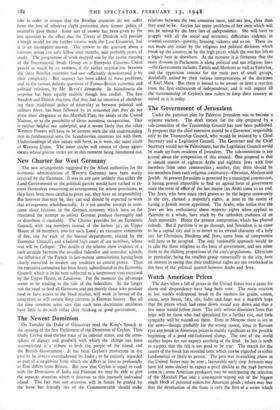The Government of Jerusalem
Under the partition plan for Palestine Jerusalem was to became a separate enclave. The draft statute for the city prepared by a sub-committee of the Trusteeship Council has now been published. It proposes that the chief executive should be a Governor, responsible only to the Trusteeship Council, who would be assisted by a Chief Secretary and a Legislative Council. The Governor and the Chief Secretary would not be Palestinians, but the Legislative Council would be made up from residents of Jerusalem. The sub-committee is not agreed about the composition of this council. One proposal is that it should consist of eighteen Arabs and eighteen Jews with four members from other communities ; another, that there should be ten members from each religious community—Christian, Moslem and Jewish. At present Jerusalem is governed by a municipal commission, it having proved impossible to find an agreed form of government since the term of office of the last mayor (an Arab) came to an end. The Jews, who have since 1918 grown to be the largest community in the city, claimed a majority's rights, at least to the extent of having a Jewish mayor appointed. The Arabs, who notice that the Jews are less enthusiastic about majority rights when applied to Palestine as a whole, have stuck by the unbroken tradition of an Arab mayoralty. Hence the present compromise, which has pleased nobody. But if partition is to go through, and Jerusalem is to cease to be a capital city and is to revert to its eternal character of a holy city for Christians, Moslems and Jews, some form of compromise will have to be accepted. The only reasonable approach would be to take the three religions as the basis of government, and not relate them to the shifting proportions of the city's populations. Christians in particular, being the smallest group numerically in the city, have an interest in seeing that their traditional rights are not overlooked in the heat of the political quarrel between Arabs and Jews.


































 Previous page
Previous page